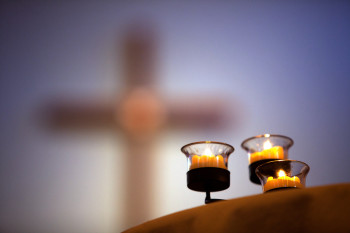Feb. 10, 2015–In the dining room of her San Francisco home, Maria Eitz shows off her priestly attire — a beautiful red, embroidered stole.
It’s the only accessory that distinguishes Eitz from the rest of her community. Usually, there is more separation, especially during mass when Catholic priests wear robes. Considering everything else, her wardrobe is a relatively minor deviation. The Vatican bans women from the altar. Yet Eitz is a woman who two years ago became a Catholic priest.
Pope Francis is widely respected among Catholics and non-Catholics alike. He’s unpretentious and committed to the poor. But about women – specifically women priests — what little he’s said is in line with conservative Catholicism. In 2013, Pope Francis said the issue was closed. No female priests allowed.

The Vatican does not recognize the women’s ordinations. It says that Jesus appointed 12 apostles and all were men. Photo by Tom Levy
“The Catholic Church has a hierarchy, and a hierarchy is totally male-oriented,” says Eitz. “Though they do not proclaim that women are secondary, in every action they live it out.”
Tired of waiting for change, an organization called RCWP is helping women to be ordained as priests and deacons. RCWP stands for Roman Catholic Women Priests and since 2002, about 160 women in the United States have gone through its training program. Many now are leading small, egalitarian congregations, a style of worship they say is a return to Christianity’s roots. The Church does not recognize the ordinations. Officially, the women are excommunicated. Eitz says she doesn’t care. Despite the declaration, there’s a movement to ordain female priests.
Maria Eitz. She became a Catholic after immigrating to the United States from Germany. Photo by Tom Levy
“The power that I’m interested in is the love of God and the love of people,” she says. “How can they take that away? How can they say we are not part of that?”
RCWP and the women priests claim to be as Catholic as the Vatican. To this point, ordinations follow strict Church protocol. At the same time, the women are rewriting the liturgy and altering some customs. In California, 10 women priests lead communities.
On a Saturday morning, 15 people stand in a circle to sing. This is the Sophia in Trinity community. Maria Eitz wears her red stole. The rest drape silk ribbons of red, blue and green around their necks. Of course, most Catholic communities meet on Sundays. But Saturdays are when this group can pray here, at St Cyprian’s in San Francisco, an Episcopal church. No Catholic place of worship will let Eitz lead under its roof.
The service is quiet and mostly serious, but not heavy. Eitz leads without much fuss. She asks others to read and at times, she invites participation.
Eitz is a priest for the Sophia in Trinity community in San Francisco. Members include a former priest and a young tech worker who drives an hour to attend services. Photo by Tom Levy
The group includes a former priest. Its youngest member is a 31-year old tech worker named Peter, who for personal reasons, did not want to give his last name. He’s a recent transplant to the Bay Area. He grew up in what he calls a “middle of the road” Minnesotan suburban Catholic community. He wasn’t looking for a woman priest, just a progressive church. He now drives an hour every other week to worship with the Sophia community. He says it is expanding his notions of God — and he still feels Catholic.
Others agree. Joan Minninger knew Eitz before her ordination, and followed her.
“It’s not that I left the church. I’ve never left the church,” says Minninger. “We are the church. But it’s important to do something that counteracts what we don’t agree with.”
During a usual mass, a priest offers the bread and wine of communion. But at Sophia in Trinity, Eitz only starts the ritual before bread and wine are passed from person to person before she gives a final blessing. Photo by Tom Levy
The Vatican invokes tradition to defend the rule. Jesus, they say, appointed 12 apostles, all of them men. That wasn’t an accident, says Father Illo, a priest and administrator for the Catholic Star of the Sea Church in San Francisco.
“The Church understands that to be normative,” Illo says. “That Jesus didn’t choose just 12 men because it was a custom of the time or he wasn’t thinking very clearly that day, but there’s a reason he chose only men and that’s his call, not ours. So the church doesn’t feel itself authorized to change that tradition, that example that he set.”
Eitz says that logic is stifling. For her, it stomps on the way she understands God. It loses a message of love that she has worked hard to cultivate.
Eitz was born in Hitler’s Germany. She lived with her grandmother until after the war, when her mother showed up and brought her to an orphanage. Miserable, she watched the sun set over the ocean each day.
“I would hurl all of my anger at the sun, all my troubles and all my questions,” she says.
At the orphanage, she discovered she had a way with kids. And so, during the Cold War, she helped smuggle children from East to West. A young woman at the time, she fell in love. Her boyfriend was Christian. Until that point, she’d had little contact with religion. The two would argue about God. Still, returning from her East German assignments, she would head straight for the church where he played the organ — songs of joy from Bach, Beethoven and Mozart, among others.
Then he was killed for political reasons. Fearing for her life, she left the country and went to England.
She didn’t plan on ever visiting a church again. But not too long after, she passed an old village chapel, and entered. She noticed something odd about the large cross that hung inside. Jesus was missing. After that it all gets fuzzy.
“The last thing that I remembered was I was clinging to the altar, staring at that empty cross,” Eitz says. “What happened after that, I am not exactly sure.”
Next thing she knew, she was in bed, sick, dreaming vividly. She can’t quite explain it, but afterwards, she began to believe in a god of love. Soon after she came to the United States, and while working at a hospital, met a Catholic priest. He baptized her. This was in the 1960s. It was the era of Vatican II, a time of liberal reform for the Church. She loved it.
“It was just wonderful,” she says. “I didn’t care much for the history of the Church and dogma and all of that. The sacraments mattered to me. And the New Testament and the Old Testament.”
She got a master’s degree in theology, helped Vietnamese refugees, and then set up a long running center for troubled children in her home. She raised four adopted kids. All that time, she was a practicing Catholic. But over the decades, the Church was undoing Vatican II’s reforms. That bothered her, as did its attitude towards women. In 2009, she joined a group with a woman Catholic priest. Two years later, they urged her to become ordained. She was in her 70s.
“I didn’t need to be a priest,” Eitz says. “And then I was unable to sleep. I tell you for weeks, I slept in increments of 20 minutes here and there.”
She told God she needed a sign. The next morning, she went out for a walk. On the sidewalk she saw a hopscotch pattern drawn with chalk. She grew excited.
“It’s a cross, except you see it is a cross that I’ve drawn many times for the kids to play on.”
It wasn’t just any old hopscotch. On it was sketched a woman with outstretched arms. It reminded her of Jesus.
Eitz became part of a movement that is putting in place its own reforms. Messages of love and inclusion trump tradition. God is no longer a “He.” During a usual mass, it is a priest who offers the bread and wine of communion. But in her service, Eitz only starts the ritual. Bread and wine are passed from person to person before she gives a final blessing.
For Eitz, the authoritarian church has lost its way.
“I sometimes wonder what they would do if Jesus showed up in a dress,” she says. “And I’m pretty sure he would be excluded.”
She views the rules of tradition as a blockade to love. For her, love is the true message of Christianity. Her rebellion from the Vatican is just an effort to return to that.
By, Judy Silber
The Spiritual Edge is a project of KALW and the Templeton Religion Trust. We’d love to hear your suggestions on what we should be covering. Leave us a comment or email us at [email protected].

